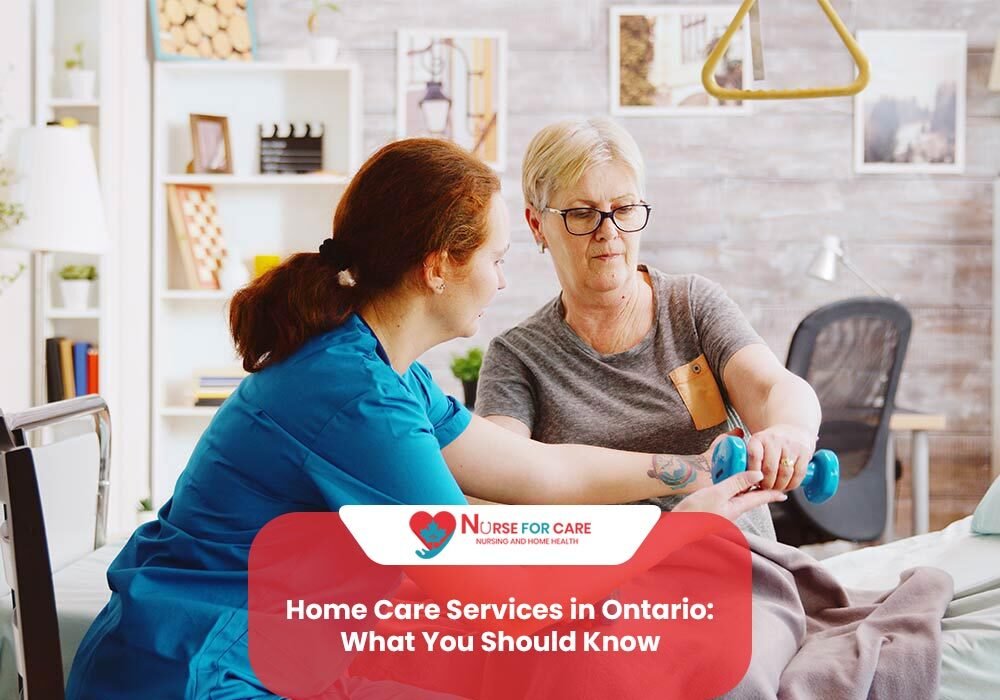Your Definitive Guide to Private and In-Home Nursing Care
From “Is it time?” to finding the perfect match: A step-by-step plan for families in Toronto.
One minute, your parents are the ones taking care of you. The next, you’re lying awake at night worrying if they took their medication, if they’re safe at home alone, or how you’ll manage it all. You’re not alone.
Quick Answer: Is a Home Care Nurse Right for Your Family?
If you’re wondering whether a home care nurse is the right choice, here’s a quick checklist to help you decide:
- Physical Health Concerns: Frequent falls, weight loss, or worsening chronic conditions.
- Cognitive Decline: Forgetfulness with medication, confusion, or difficulty following conversations.
- Home Safety Issues: Cluttered home, expired food, or unopened mail piling up.
- Hygiene Decline: Neglecting personal grooming or wearing the same clothes for days.
If these signs resonate, it may be time to explore private nursing care at home.
What is Private Nursing Care?
Private nursing care provides professional, personalized medical and non-medical support in the comfort of your loved one’s home. It ranges from companion care to skilled nursing care, depending on the level of assistance needed.

Levels of Care: What Do You Need?
Level of Care | Who Provides It | Common Tasks |
Companion Care | Companion / Homemaker | Social interaction, light housekeeping, meal prep, errands, transportation. |
Personal Care | PSW (Personal Support Worker) / HHA | All companion tasks + bathing, dressing, toileting, and mobility assistance. |
Skilled Nursing Care | RN (Registered Nurse) / LPN | All of the above + wound care, injections, IV therapy, and complex medication. |
When is a Care Facility a Better Option?
While a home health care nurse is ideal for many, there are situations where a care facility might be better:
- Advanced Dementia: Requiring a secure environment to prevent wandering.
- Intense Loneliness: Benefiting from 24/7 peer interaction and social engagement.
- Complex Medical Needs: Requiring a team of specialists available around the clock.
Step-by-Step Guide to Hiring a Home Care Nurse
1. Decide Between an Agency or Private Hire
When you face a difficult choice between hiring private Nurse on your own or through an agency it is wise to first understand the scenario of Home care services in Ontario, or any region of Canada and weigh up the pros and cons. We have some listed out for you below
Hiring Through an Agency | Hiring a Private Nurse |
Pros: Caregivers are screened, insured, and payroll is handled. Backup care is provided. | Pros: Lower hourly rates, direct control over hiring and scheduling. |
Cons: Higher hourly rates, less say in caregiver selection. | Cons: You handle background checks, payroll, and finding backup care. |
Pro Tip: A reputable PSW agency in Toronto, like Nurse for Care, can simplify the process and provide peace of mind.
2. Create a Plan of Care
A Plan of Care is a detailed document outlining:
- Specific tasks the caregiver will perform.
- Goals for your loved one’s care.
- A daily/weekly schedule.
This document is your most important tool for preventing misunderstandings and ensuring your loved one receives consistent, personalized care, giving you true peace of mind.
3. Ask the Right Questions
For Agencies:
- How do you screen and train your caregivers?
- Are all caregivers bonded and insured?
- What happens if we’re not compatible with a caregiver?
For Private Hires:
- Can you provide proof of certification and insurance?
- Can I speak to three professional references?
- What’s your backup plan if you’re unavailable?
How to Build a Strong Relationship with Your Home Care Nurse
Hiring a home care nurse is just the first step. Building a strong, respectful relationship ensures the best care for your loved ones.

1. Set Clear Expectations
- Use the Plan of Care to define roles and responsibilities.
- Be upfront about your loved one’s preferences, routines, and any special needs.
2. Communicate Regularly
- Schedule weekly check-ins to discuss progress, challenges, and any adjustments needed.
- Use a communication log (a simple notebook or app) to track daily updates.
3. Show Appreciation
- A simple “thank you” can go a long way in fostering a positive relationship.
- Celebrate milestones, like your loved one’s improved mobility or health.
4. Respect Boundaries
- Remember that your caregiver is a professional. Avoid asking them to perform tasks outside their scope, like major cleaning or errands for other family members.
Making the Transition Smooth
How to Introduce the Idea of Care
This conversation can be tough. Frame it as a way to support their independence.

- Say This: “Dad, having some help with meals and medication means you can stay in this house safely, which is what we all want.”
Involve them in the hiring process to give them a sense of control.
The First Week of Care
- Prepare an Info Sheet: Include emergency contacts, medication lists, and routines.
- Be Present: Attend the first few shifts to facilitate introductions.
- Schedule a Check-In: After the first week, discuss how things are going.
Troubleshooting Common Issues
- What if my parent doesn’t like the nurse?
Request a different caregiver through the agency. Personality fit matters! - How do I ensure clear communication?
Use a notebook as a communication log for daily updates. - What are the boundaries?
Caregivers should only perform tasks outlined in the Plan of Care.
Conclusion: Your Path to Peace of Mind
Choosing the right home care nurse is a profound act of love. Now, armed with this guide, you have a clear plan to move forward with confidence.
Feeling overwhelmed? Nurse for Care can help. Schedule a free, no-obligation consultation to discuss your family’s unique needs.
Q&A Corner
Coverage depends on your health insurance plan. Many extended health benefit plans include provisions for private nursing or personal support services. It's best to consult your insurance provider for details
Look for qualifications, experience, references, and compatibility with the patient’s needs. Agencies often handle background checks and provide insured caregivers, while private hires may require more direct involvement in the hiring process
Live-in care involves a caregiver staying with the client 24/7, providing consistent support, while hourly care is scheduled for specific times and tasks. The choice depends on the level of assistance required
Private nurses provide a range of services, including personal support (bathing, dressing, mobility assistance), skilled nursing (wound care, injections, IV therapy), and specialized care for conditions like dementia or post-surgical recovery
Costs vary depending on the type of care (hourly, live-in, or specialized services) and the provider. Hourly rates are common, while live-in care may offer a more cost-effective solution for 24-hour support



